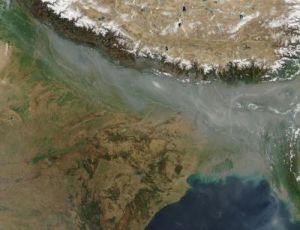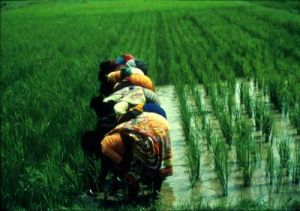Reducing air pollution could increase rice harvests in India
Dec 4, 2006 - 2:53:24 PM
, Reviewed by: Priya Saxena
|
|
|
"The major finding of this interdisciplinary study is that their effects on rice production are additive, which is clearly an unwelcome surprise."
|
By Scripps Institution of Oceanography,
[RxPG] New research from the University of California indicates that reductions of human-generated air pollution could create unexpected agricultural benefits in one of the world's poorest regions. These new findings will be published online the week of Dec. 4 in the journal Proceedings of the National Academy of Sciences (PNAS).
Rice harvests increased dramatically in India during the "Green Revolution" of the 1960s and 1970s, making the country self-sufficient in its staple food. Harvest growth has slowed since the mid-1980s, however, raising concerns that food shortages could recur in this densely populated and poor nation. Several explanations for the slowdown have been proposed, but until now, none took into account the complex interactions of two pollution-related sources of climate change: atmospheric brown clouds (ABCs), which form from soot and other fine particles in the air (collectively termed aerosols), and the better-known problem of global warming caused by greenhouse gases such as carbon dioxide.
In the PNAS paper, Maximilian Auffhammer at UC Berkeley's College of Natural Resources, and V. "Ram" Ramanathan and Jeffrey Vincent, researchers at UC San Diego, analyze historical data on Indian rice harvests and examine the combined effects of atmospheric brown clouds and greenhouse gases on growing conditions. They find that the combined effects were negative and were greater after the mid-1980s than before, coinciding with the observed slowdown in harvest growth. They estimate that harvests would have been 20 to 25 percent higher during some years in the 1990s if the negative climate impacts had not occurred.
 |
| In this image, taken February 5, 2006, by NASA's Aqua satellite, a pale band of haze covers northern India, just south of the Himalaya. Haze also intrudes into the skies of southern Nepal and Bangladesh. A study by UC researchers suggests that reducing air pollution could increase rice harvests in India. Credit: Image courtesy Jeff Schmaltz, Moderate Resolution Imaging Spectroradiometer Land Rapid Response Team at the NASA Goddard Space Flight Center |
Previous research by an international scientific team led by Ramanathan, professor of atmospheric sciences at Scripps Institution of Oceanography, found that brown clouds have made the Indian subcontinent drier and cooler. Although this suggests the existence of a climatic tradeoff, with reductions in aerosols potentially unleashing a stronger warming trend, the current study indicates that joint reductions in the two types of pollutants would, in fact, benefit Indian rice farmers. This is because reductions in aerosols would enhance rainfall, while reductions in greenhouse gases would reduce the higher nighttime temperatures that can negatively affect the growth of the rice plant.
"Greenhouse gases and aerosols in brown clouds are known to be competing factors in global warming," said Ramanathan. "The major finding of this interdisciplinary study is that their effects on rice production are additive, which is clearly an unwelcome surprise."
Peter Timmer, senior fellow at the Center for Global Development, an independent, non-profit think tank in Washington, D.C., added that the study "links a sophisticated model of agricultural production in India to climate and pollution models, with the critical finding that 'brown cloud' pollution has already cost India millions of tons of food production."
 |
| Shown are farmers harvesting rice in India. Credit: Photo courtesy of the International Rice Research Institute |
The researchers noted that the impact of ABCs and greenhouse gases on agriculture provides another incentive for controlling air pollution in heavily polluted Asia. "Air pollution control measures in India have been motivated mainly by concern about the health of residents of the urban areas where most of the pollution is generated," said Vincent, an economist and environmental research director at the UC Institute on Global Conflict and Cooperation (IGCC). "Our study provides an additional motivation related to the economic health of poor rural areas."
Auffhammer, UC Berkeley assistant professor of agricultural and resource economics, added that "while this study focuses on India's rain-fed states, ABCs exist throughout Asia's main rice-producing countries, many of which have experienced decreasing growth rates in harvests, too. Furthering our understanding of how air pollution affects agricultural output is very important to ensure food security in the world's most populous region."
Publication:
These new findings will be published online the week of Dec. 4 in the journal Proceedings of the National Academy of Sciences (PNAS).
On the web:
sio.ucsd.edu 
|
Advertise in this space for $10 per month.
Contact us today.
|
 |
|
Subscribe to Climate Newsletter
|
|
|
|
Additional information about the news article
|
The paper is the result of a three-year collaboration between Auffhammer, Ramanathan and Vincent. Their work was supported in part by the Giannini Foundation, the National Science Foundation, the National Oceanic and Atmospheric Administration and IGCC.
|
|
Feedback
|
For any corrections of factual information, to contact the editors or to send
any medical news or health news press releases, use
feedback form
|
Top of Page
|



